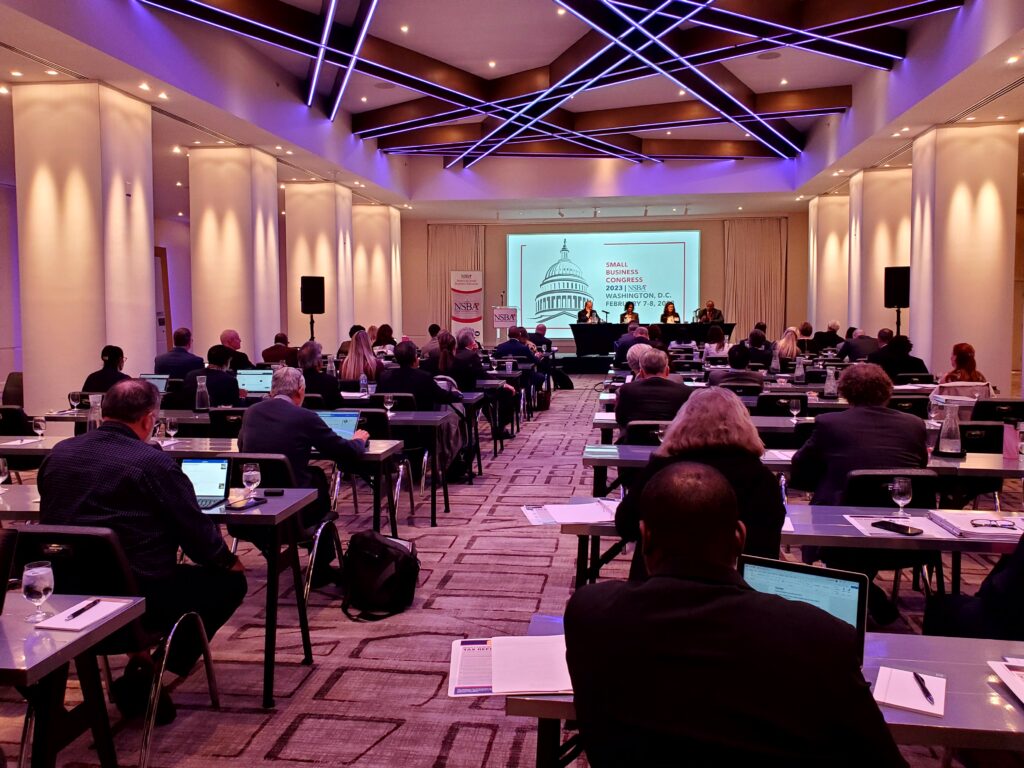On February 7, Advocacy staff attended the National Small Business Association’s (NSBA) Small Business Congress 2023. The Small Business Congress occurs every two years and brings together small business leaders to discuss and develop NSBA’s small business agenda for the new Congress. The event provided Advocacy with an opportunity to connect with small business owners and their representatives and inform them on the work we conduct on behalf of America’s small businesses.
Deputy Chief Counsel Major Clark and Assistant Chief Counsel Janis Reyes participated in an issue panel focusing on regulatory affairs on the first day of the conference. They were joined by Joy Melody Ragsdale of the Federal Communications Commission’s Office of Communications and panel moderator Timothy Opsitnick, NSBA’s Environment and Regulatory Affairs Committee Chair.
To kick off the panel, Opsitnick asked the audience, “how many of you believe that the government regulates you too much?” In a room of over 150 people, nearly every participant raised their hand. This is a complaint that Advocacy staff often hear when talking to our stakeholders, and the question provided an opportunity to introduce the audience to the Office of Advocacy and our role in the regulatory process.

NSBA Small Business Congress Participants
Many participants seemed surprised at Advocacy’s close relationship with agencies during the federal rulemaking process. Deputy Chief Counsel Clark explained that our independence allows us to advocate for changes to regulations to alleviate potential burdens on small businesses regardless of which political party is in power.
When asked about the top regulatory issues in labor that small businesses are facing, Assistant Chief Counsel Reyes highlighted two recent public comment letters to agencies. The first is the Department of Labor’s independent contractor rule, which helps employers determine whether a worker is an independent contractor or an employee under the Fair Labor Standards Act. The second is the National Labor Relations Board’s joint employer rule, which determines which employer is liable for labor violations under the National Labor Relations Act. In both letters, Advocacy recommended that the agencies reassess the compliance costs of these rules for small businesses and clarify regulatory provisions.
Reyes also discussed a proposed rule by the United States Citizenship and Immigration Services (USCIS) that would double or triple the fees for business visa petitions. Reyes urged small businesses to provide comments to USCIS by March 13, 2023 (the original deadline was March 6, but USCIS extended the deadline).
The final question asked the panel members how small business owners can keep informed on what is happening in the regulatory arena. For those that want to stay up to date on new regulatory activity that may impact small businesses, be sure to follow us on our Twitter, Facebook, and LinkedIn. Advocacy posts regulatory alerts on the web weekly. Additionally, you can subscribe to our listserv to receive email updates on regulatory alerts and Advocacy’s comment letters.
After the panel, numerous audience members approached us asking to exchange business cards and picked up our brochure providing more information on our office. Some members briefly discussed various regulatory issues they would like to talk to us about in more detail, excited for the opportunity to share their concerns. One participant even asked us about the best place to file a comment letter to ensure that an agency reads her comments.
We look forward to continuing to work with the NSBA and its members to find solutions to small businesses’ regulatory concerns and hope our participation in the conference helped inform NSBA’s small business agenda for the 118th Congress.
